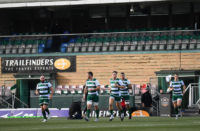 Dave Attwood has that combination of brains as well as brawn that is a treasured commodity in most sports, but in Rugby Union especially. Attwood is not the first ‘thinking man's' lock, because Steve Borthwick, the Saracens veteran he will be hoping to eclipse when Bath visit Allianz Park today, has already laid claim to that title.
Dave Attwood has that combination of brains as well as brawn that is a treasured commodity in most sports, but in Rugby Union especially. Attwood is not the first ‘thinking man's' lock, because Steve Borthwick, the Saracens veteran he will be hoping to eclipse when Bath visit Allianz Park today, has already laid claim to that title.
However, Attwood is the first genuinely big unit to give the England selectors a nudge since Simon Shaw and Martin Johnson hung up their boots – and neither of them had the Bath second row's academic credentials.
Attwood, whose 6ft 7in (2.01m) and 18st 8lb (118kg) dimensions are identical to Johnson's, has a degree in physics and philosophy from Bristol University. There is a sense also that, like the Leicester and England legend, Attwood is his own man.
It is an impression that is reinforced when you speak to him. “The degree's a bit of a strange mix I hear you thinking, but I call it ‘problems and problem-solving', so it actually fits together very well.”
It is also the ideal training, in terms of mental rigour, for addressing the shortfalls in forward focus and power – particularly in the set-piece nuts and bolts and driving tight-five play – that have bedevilled not only his club, but his country, for more years than Bath or England fans care to remember.
It is not an accident that the rediscovery of core skills and the green shoots of a forward a revival, both at the Recreation Ground at the start of this season, and for England on their victorious summer tour of Argentina, have coincided with Attwood's own reawakening after two years in the doldrums.
After making a mark for Bath with steadily improving showings in the second half of last season, Stuart Lancaster gave Attwood the chance that he craved to add to his two England bench caps (against New Zealand and Samoa in autumn 2010) in the two-Test series against the Pumas. The England head coach was rewarded when we saw a Red Rose driving maul worthy of the name for the first time in a decade, with Attwood at its heart. At the same time the Bath lock proved to be a canny lineout caller, plundering the understrength Pumas throw at will, and he responded impressively overall to Lancaster's challenge to become a leader of the pack.

Attwood, 26, speaks passionately about the driving maul. “It's the most effective attacking force in the game, but it only takes one attacker in the maul to get it wrong, or one defender to get it right, and it's over in a flash. Every forward has to understand that, so, if players are subbed in and out, it does not limit the maul's effectiveness.
“It was a strength for us in Argentina, as was the set-piece in general. We stole almost 80 percent of their line-out in the first Test, which was a great personal benchmark for me. As for the driving maul, historically it's done great things for England and I'm sure it will again – hopefully, it's a strength again this autumn.”
The two-nil series win prompted questions about what had happened in the aftermath of Attwood being hailed as the great white hope after being selected by Johnson, then England's manager, for the 2010 summer tour of Australia.
Having emerged through the Bristol Academy before joining Gloucester, Attwood showed rich promise Down Under and was being groomed for the World Cup in New Zealand.
However, things went downhill fast from there. He found himself surplus to England's 2011 Six Nations requirements after being given a nine-week ban for stamping on La Rochelle prop Petrisor Toderasc. Then, after a high-profile transfer to Bath, he was stranded in no-man's land after being sidelined with a nagging pelvic injury. Attwood admits that the disciplinary and injury problems led to his career stalling.
“The ban set me back because it was long-term, which took me out of the limelight. I lost my position in the squad at Gloucester, and also with England, so when I left to join Bath I had to start all over again.”
He adds: “The pelvic injury affected me for five months, and left me unable to play for three. The squad at Bath was very welcoming, but the injury made it difficult. It's the last thing you want when you join a new club because it's hard to build up relationships when you're stuck on the touchline. Then I had a long pre-season and, with the support of the Bath medical team, we managed to fix it without surgery.”
In the down-time Attwood had no difficulty keeping busy. “I've got old man interests. I like working with my hands and doing something practical. At the moment I'm busy renovating my Victorian house. I'm installing my kitchen – and the tops are made more for someone of my size rather than my missus, whose only 5ft 7in.”
When it comes to the day job Attwood says it has been about making steady increments since recovering. “In the front five you don't go from 0 to 60mph overnight. It's about notching up with each performance – that's what got me playing to a good level again.”
He says his England recall came as a surprise. “I got into form because I concentrated on playing for Bath, not on international rugby, but I'm more aware of the opportunity for England than I was last time. There's a lot more backing it up because my game has developed. I'm a few years older, and a lot better player – more polished, more rounded, more experienced, and with more insight into how I can contribute to bringing about the right result.”
He adds: “My physicality has shifted since the ban. I realise that it's important to control and channel aggression, whether it's in tackles or ball carries. I've done that, and last year I was one of the most effective tacklers in the Bath squad.”
He says that he has also always had an interest in running the lineout – a component high on Lancaster's lock list. “I've always taken a hand in running lineouts, whether with the United at Bristol or for Gloucester. Now, with Stuart Hooper and me, Bath have two lineout leaders, and they are happy for either of us to do it.”
Attwood confirms that careful analysis is the key. “You have to do the due diligence because when you play against the likes of Steve Borthwick you can come unstuck. I've learned alongside guys like Stuart Hooper, and, when I was at Gloucester, Alex Brown, that you have to do your homework – because, if you don't, you'll get taken to the cleaners.”

Attwood is also fortunate that Bath have an impressive lineout brains trust. Gary Gold, their director of rugby, was instrumental in building one of the great international lineouts for South Africa around Victor Matfield and Bakkies Botha. First team coach, Toby Booth, earned plaudits at club level with a dominant London Irish lineout featuring Bob Casey and Nick Kennedy.
“They are some of the best lineout coaches in this or any country,” Attwood says. “One of the reasons they are so good is that they are open to new ideas and value honest conversations with their players.”
The result is that Bath's driving lineout has improved out of sight, and on the evidence of their two wins out of two – at home to Leicester last weekend and away at Newcastle in round one – now appears to be one of the best in the Premiership.
Attwood senses a new conviction about Bath. “We've had more time together more as a squad, and as a coaching set-up, and it's more streamlined and starting to tell on match day – whereas last season it didn't.”
However, he still treats the positives warily, including beating the English champions. “It's a great marker for us climbing up the ladder and establishing where we want to be, but we've won nothing yet, and we've already pushed the win over Leicester out of the way.”
The business in hand against Saracens makes that imperative, and although he has surprisingly been given a spell on the bench – moving to an impact role after starting in the first two wins – he says taking on another unbeaten side demands total focus.
“Saracens have a very effective style, and we must make sure that we are not caught flat-footed. We have to carry a combination of the ‘smarts' that we showed against Newcastle, and the edge we showed against Leicester.”
Attwood recognises that any player with 2015 World Cup ambitions has to put his hand up this season, however, having had one fall from grace, he is careful not to get ahead of himself.
“Of course this is a key season for the World Cup, but the most important thing is to perform weekly for Bath. I'm more aware of what those two England caps in Argentina mean. I was a bit of a rabbit in the headlights last time, but I feel I've earned these more, and am more deserving of being in that Test environment.”
Ask Attwood what he considers the ideal second-row combination and the response is an immediate, “Me, and someone else!” After a chuckle he adds, “You need power, strength, and weight, but you also need locks with movement.
“The days of the beanpole and the big guy paired together have gone. Now, you need more of a balance with guys of similar stature who can not only make big carries and tackles, but are also good at the set-piece – because it's so important. As for running a lineout, it's more about having brainpower than about being skinny.”
He adds that he hopes to force his way into the England second row for the autumn series by delivering on all fronts for his club.
“It's about physicality, impact tackles, and strong carries – as well as running the lineout efficiently. What Stuart Lancaster wants is for me to do that consistently for Bath. It's about being good at the set-piece and having mobility. It's about not letting the game pass you by, and being involved in making a big impact in big moments.”
The hole left by the departure of mighty combatants like Johnson and Shaw has not yet been filled by England, but there are signs that in Dave Attwood they might have a hard-bitten second row with the skill-set, the physicality, and the intelligence to fill it.
One Comment
Leave a Comment
You must be logged in to post a comment.



























Pingback: ดูดวงความรัก